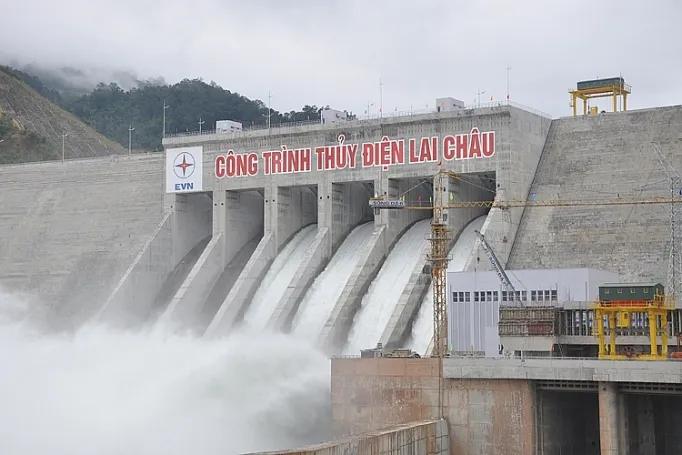
However, the business continued to fall dramatically in the following years, bringing stocks of S99 down to below VND 4,000 per share.
Breakout into other fields
The old name of S99 is Song Da 909 Joint Stock Company, under Song Da Corporation, that was established in 1998. The company’s main business is building hydroelectric power plants. Lai Chau, Son La, Tuyen Quang and Se San 3 are major hydroelectric projects which S99 constructed. In recent years, S99 has also participated in the construction of infrastructure transportation works, such as Highway 1A, Ho Chi Minh road, Vietnam-Czech Hospital in Hai Phong, and roads in Ke Sach District in Soc Trang province.
In 2003, S99 was equitized with charter capital of VND 3 bn. After completing equitization, S99 registered to trade shares on HNX in 2006. This was considered an important turning point for S99, because after listing this stock, the company continuously issued shares to raise capital. Specifically, in 2007 the company increased capital from VND 3 bn to 15 bn; in 2009 to VND 44.5 bn; in 2010 to VND 80 bn; and upto VND 99 bn in 2011. During this period, the S99 capital raising plan went quite smoothly, because during this time the company had high production growth. Compared to profits in 2006 which were only VND 3 bn, the increase in 2009 was upto VND 22 bn, a seven-fold increase.
During this period, S99 created a “fever” in the stock market. On 22 December 2006, S99 offered a closing price of VND 29,000 per share on HNX trading session. In the context of the stock market with few listed companies, S99 became a hot stock code and continuously "sold out" because investors rushed to buy. S99 even created a "seismic" with prolonged chain and established a peak of VND 440,000 per share on 26 July 2007. Thus, within seven months after listing, S99 recorded an increase of more than 15 times.
Unplanned investments
However, after the sublimation period in 2007, S99 was unable to maintain its lead position on the HNX and continued to decline. However, the cause of this decline was not derived from the impact of the general market, but from poor business and production activities. From a peak of VND 440,000 per share, S99 plummeted and continuously touched bottom. By mid-2013, S99 traded below par value at only VND 3,500 per share.
Production and business activities of S99 showed signs of slowing down since 2011, with after-tax profit at that time at only VND 320 mn and an inability to pay 4% dividend as planned. According to the explanation given by the Board of Directors, the reason was that the project investors had difficulty with capital, along with rising interest expenses, which then had direct impact on the business.
By the end of 2011, unfinished production and business expenses amounted to VND 68 bn, and account receivables from customers were VND 28 bn. Notably, the financial expense increased sharply to VND 19 bn due to increase in real interest rates, which pushed up interest expenses and provisions for large financial investments. It is known that S99 invested VND 12 bn in the stock market and had to make a provision of VND 8 bn in 2011.
In 2012, S99 unexpectedly made a large profit, thanks to the return on financial investments due to the holding stocks that had risen again. However, financial investment activities were still the main reason pushing S99 into a difficult situation. In 2013, S99 even had to stop two investment projects in the field of real estate in Hanoi, including investment projects to renovate and rebuild houses A2, B1, B2 and B3 in Ngoc Khanh apartment area in Ba Dinh district, and a project to rehabilitate and rebuild Vinh Ho apartment complex in Dong Da district.
No light at end of tunnel
To tackle the demand for capital, S99 continually issued additional shares to raise capital. However, unlike in the first period, the decline in business results made S99 capital more inaccessible. At the General Meeting of Shareholders in 2012, the Board of Directors of S99 approved a cancellation plan to raise capital to VND 400 bn, and increase new capital from VND 99 bn to VND 200 bn. Earlier, S99 had applied for a new share issuance license to raise capital from VND 99 bn to VND 170 bn, but due to the share price falling below par value, the issuance could not be done.
This effort partly helped S99 to have a sudden profit in 2014 of VND 20.4 bn (up 664%), and EPS reached VND 1,713 per share (up 645%). This satisfactory result helped S99 to raise capital to VND 370 bn in the second quarter of 2015. The Board of S99 also planned to issue bonds to raise capital up to VND 200 bn, serving the business development plan in the direction of restructuring.
However, the new direction still could not make shareholders feel secure when the company suddenly reported a loss of VND 18.5 bn in 2017. This result caused S99 to be put on alert by HNX. Although in 2018, S99 had been removed from the warning list thanks to its profitable business, the price of the stock could not return to face value of VND 10,000 per share and investors remained cautious.




















